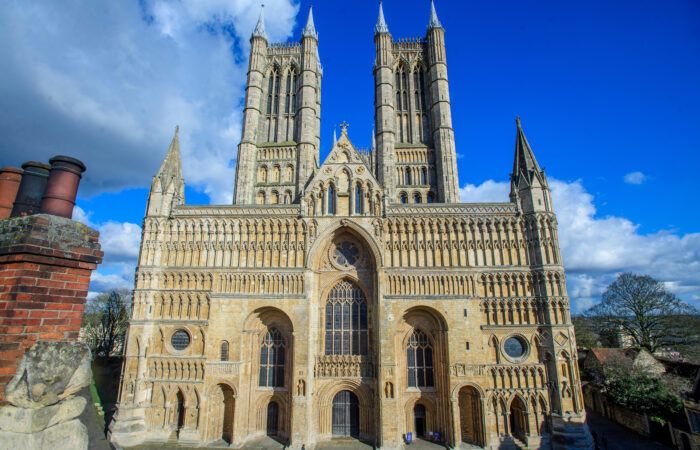Sermon by the Very Reverend Christine Wilson, Dean of Lincoln
In the children’s resource called Godly Play there is a wonderful teaching tool by way of a liturgical clock. It comes complete with hands and liturgical colours which are set around the dial to track and explain the seasons of the church year.
It describes the long stretch of Sundays after Trinity, as the green and growing time. A time away from the major fasts and festivals when we give attention to the ministry of Jesus and his teaching.
Green – which conjurs up images of lush verdant pastures, the provision of spiritual food in which to graze as the sheep of Christ’s flock.
And growing – to symbolise the time and space for spiritual nurture and developing in wisdom.
It gives us an image of both rest and productivity, of contemplation and activity: the daily work of prayer, study and service that brings forth fruit in readiness for the Harvest.
Metaphors can sometimes let you down and the parched dry and rather barren looking sight of my lawn over the last month has spoken more of a place of great thirst and even of neglect. Only now is it beginning to revive and regenerate to be green and growing once again.
But the small former piggery behind the deanery garage has remained altogether a different place. Watered and tended daily during the drought, keeping me fit with the endless carting of watering cans. It is a picture of green and growing, an abundance of food: beans of many varieties, courgettes, brightly coloured chard, and the promise of lots of tomatoes. A wonderful profusion of fruitfulness and productivity.
It all takes time and effort the very opposite of fast food.
The non-gardeners may be wondering “Why bother?” But the results speak for themselves – delicious, full of flavour and goodness. There is something deeply satisfying about gathering it in, sharing it around and eating it.
I want you to hang on to that thought of: Gathering, sharing and eating.
But before we leave the images of my garden as a metaphor for spiritual health and well-being, as you think about the green and growing season of ordinary time, I wonder, how you might describe yourself? Are you like my piggery irrigated and fruitful or do you feel like that parched lawn where only the weeds managed to keep going and the coarse bits of grass at the edges that are particularly resilient?
What is apparent as we look out on the lawns today, is that very quickly with the right conditions they have returned to be green and growing.
The readings throughout this month have continuously spoken about nourishment and food. We have had several weeks dwelling on the words: I am the bread of life.
Today we are invited to consider how and where to replenish ourselves with life that is enriched with wisdom and joy.
The extract from Proverbs invites us to “lay aside immaturity, and live, and walk in the way of insight.”
We are to cultivate wisdom.
One commentator suggests that when it comes to putting on a lavish feast, wisdom is “the hostess with mostest.”
Calling out and inviting people to come to their senses and enjoy all that she has to offer, all that is prepared and waiting to be received.
“Come, eat of my bread
and drink of the wine I have mixed.
We discover in our reading from Ephesians a very clear indication that nurturing our well-being, both physically and spiritually, is found as we gather together as a community.
In the text from Proverbs all can come to the banquet. This is not a feast to be had in solitude or reserved for an exclusive few. We are told the servant girls stand at the top of the highest place where all might hear, to offer the invitation to come.
It is a party thrown open to everyone. Bread and wine indicate that it will be satisfying and joyful.
The community that gathers in Ephesus are encouraged to sing and be joyful as they worship and give thanks at all times in the name of our Lord Jesus Christ.
I was reflecting how ironic it is that we have no choir to assist us in this joyful task this morning. But that has actually given us the opportunity to sing more!
If we go back to that thought about green and growing, flourishing and bearing fruit. No matter how hungry or drought stricken we may feel at times, Christ offers himself to us as the bread of life. Food that is satisfying and a source of delight: to revive, renew, replenish and transform all that he fills with his life and light.
That is the Good News which we gather to proclaim. It is the source of our thanksgiving and song. Wisdom is knowing that to be true and taking hold of it.
Like the servant girls in Proverbs we too are called to throw open our doors, proclaim from the highest point, the invitation to come.
The Book of Prayer does just this in the preparation to celebrate and invitation to receive Holy Communion in the aptly named comfortable words:
Come unto me all you who are weary and heavy laden and I will refresh you.
Jesus in the gospels declares: I have come that you might have life, life in all its fullness.
And this morning with the words:
I am the living bread that came down from heaven, whoever eats this bread will live forever.
If Jesus is the bread of life and the source of life in all its fullness it is beholden upon us, as his followers, to share this bread with others.
To make known the gift and joy that Christ offers to the world.
Here today and at every Eucharist we come to receive God’s gracious hospitality. Food for our minds and our souls.
And through this gift of grace we become sacramental people, grace-filled people sent out to share his life-giving presence with a hungry world.
Wisdom reveals that Christ offers the life we need rather than the life we want or the life we are told we should desire by the advertisers and the media.
Jesus the Bread of life is sustenance, friendship, love and light offered to all people everywhere.
We take hold in our open hands the life that is truly life. The life we need rather than the life we want.
This s bread that reminds us of the greatness and the humility of Christ.
Of the extraordinary paradox of divinity and humanity, of death and resurrection, of kingship and servanthood,
Of God who stooped low and came amongst us as flesh and blood to meet us in our need and bring us a life of joy and hope, of fellowship and love.
We live in a world of hunger and scarcity, of cut backs and food banks, of loneliness and homelessness. The rich grow ever richer and the poor long for crumbs from the table.
As God’s sacramental people, sharing the Good News and being the living signs of God’s grace, how and where can we pour out his love and his life. What might we do to transform lives and bring them to the green and growing pastures of his Kingdom?
Brothers and sisters let us commit ourselves to sharing what we receive with joy this morning.
A challenging place for us to begin is right here on the doorstep of this cathedral where a number of hungry and homeless individuals are sleeping rough every night.
May the Lord give us the courage and wisdom to nurture and nourish them. Amen.

